Iran Human Rights
TAKE ACTION TO PREVENT THE IMMINENT EXECUTION OF SWEDISH-IRANIAN EMERGENCY MEDICINe eXPErt
An egregious example of the deployment of the death penalty for political purposes is the case of Dr. Ahmadreza Djalali, a Swedish-Iranian specialist in emergency medicine. He barely escaped an execution scheduled to take place on December 1 after an international outcry, including a letter signed by 153 Nobel science prizes laureates. and was given a reprieve of unknown duration. Now it has been reported that his execution may be carried out by May 21, 2022. Please take action immediately to call for a halt to this execution. Amnesty issued a statement detailing its findings that Dr. Djalali is being held as a hostage—a clear violation of international law–and that the threat of his imminent execution is being used as a form of extortion.
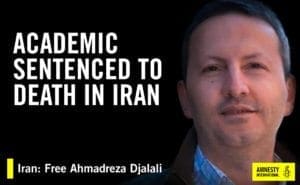
Dr. Djalali was sentenced to death for “corruption on earth” (efsad-e fel-arz) in October 2017 after a grossly unfair trial before Branch 15 of the Revolutionary Court in Tehran. The court relied primarily on “confessions” that Ahmadreza Djalali says were obtained under torture and other ill-treatment while he was held in prolonged solitary confinement without access to a lawyer. He had been arrested in April 2016 while on a trip to Iran at the invitation of Tehran University to speak about disaster medicine. He was accused of providing information to Israel that was allegedly used in the assassination of several Iranian scientists. Iranian State television aired the “confession” in December 2017. Dr. Djalali could be executed at any time Activists are urged to write to write to the head of the judiciary in Iran via Iran’s Permanent Mission to the UN in Geneva at the following email addresses: [email protected] and [email protected] .
Iranian Authorities RESPonsible for dozens of deaths in Custody in the last 12 years
In a report released on 12 April 2022 Amnesty International has documented the cases of 96 people who died in custody in Iran since 2010. Iranian officials have refused to investigate and hold those responsible accountable. Amnesty has reported how prison authorities routinely cause or contribute to deaths in custody, including by blocking or delaying prisoners’ access to emergency hospitalization and other necessary medical care. At least 11 prisoners died after being denied adequate healthcare for traumatic injuries that occurred at the time of arrest or during imprisonment. The other 85 prisoners died after being denied adequate medical care for serious medical emergencies involving, among things, heart attacks and strokes, gastrointestinal complications, respiratory complications, kidney problems, Covid-19 or other infectious diseases, which either emerged suddenly or were related to pre-existing illnesses for which they had not received adequate specialized healthcare throughout their imprisonment.
Nowruz Action


EXECUTION OF JUVENILE OFFENDER
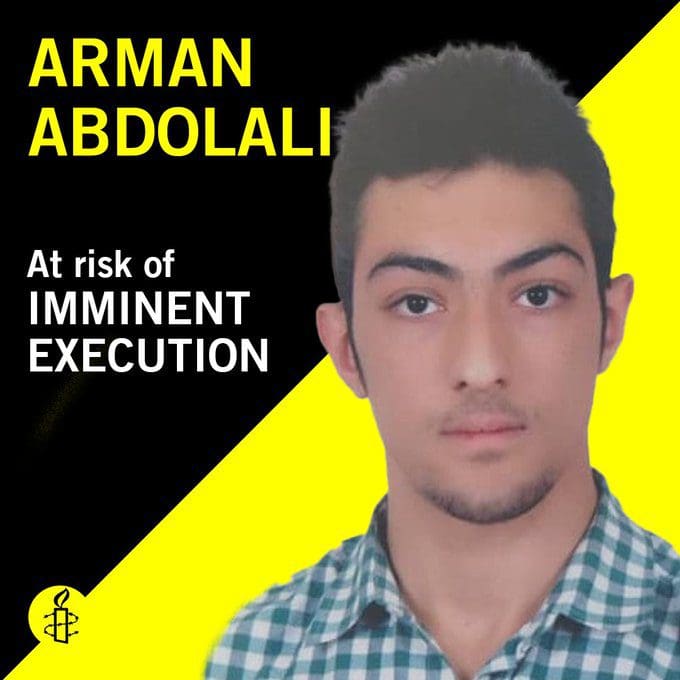

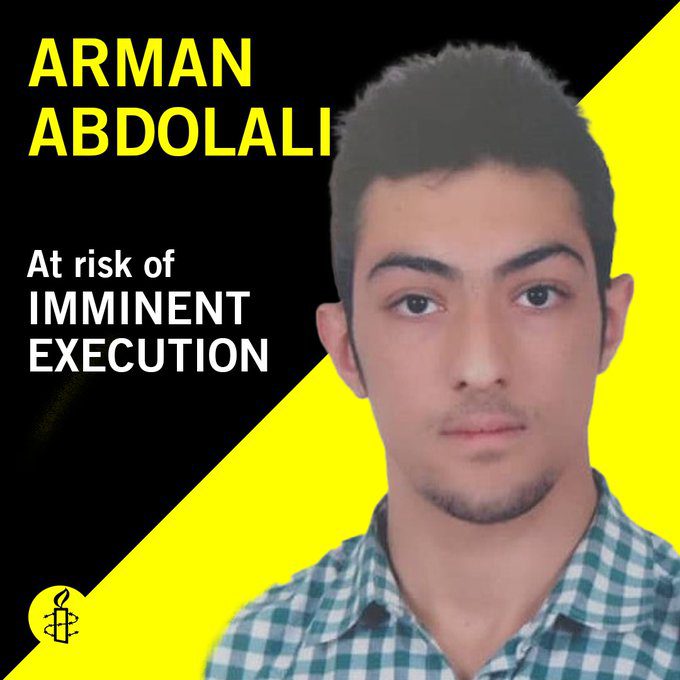
SECURITY FORCES USE DEADLY FORCE TO SUPPRESS PROTESTS
In August 2022 Amnesty International issued a briefing about the use of excessive and indiscriminate force against mostly peaceful protests that took place in Southwestern Iran in May 2022. The use of live ammunition and birdshot resulted in a number of deaths and injuries among protesters and bystanders. This use of violence reflects increasing militarization of the policing of protests in recent years, which has left hundreds of protesters and bystanders, including children, dead and thousands of others injured since December 2017. On November 11, 2021 Amnesty International issued a press release noting that an international “people’s tribunal” on the Iranian authorities’ killing and wounding of thousands of protesters and bystanders during nationwide protests in November 2019 is a powerful initiative against impunity and must serve as a wake-up call to all UN member states. AI Iran researcher Raha Bahreini presented expert testimony at the tribunal, which also included evidence heard from dozens of witnesses, such as protesters, victims’ relatives, torture survivors, healthcare workers and former security officials. Several expert witnesses will also testify before the tribunal, which will be presided over by prominent lawyers and judges. On the same day Amnesty released a report detailing the deaths of 323 people who were killed by Iran’s security forces during the crackdown on the protests.
On July 23, 2021 Amnesty International issued a press release condemning the use of deadly force against mostly peaceful protests in the southwestern province of Khuzestan. Video footage together with consistent accounts from the ground, indicate security forces used deadly automatic weapons, shotguns with inherently indiscriminate ammunition, and tear gas to disperse protesters, resulting in the deaths of at least eight people and scores of injuries. Many others have been arrested. Protesters took to the streets in Khuzestan—one of Iran’s poorest regions, inhabited largely by Arabic speaking Ahwazis—because of severe water shortages and power outages due to drought and climate change; many were chanting “we are thirsty.” The Iranian authorities have long responded to peaceful protests with violence, including the use of live ammunition and the arrests, torture and mistreatment of those exercising their right to peaceful assembly and expression. Amnesty International is calling on the Iranian authorities to immediately cease the use of indiscriminate violence, to release all those detained solely for peacefully exercising their right to freedom of expression and assembly, and to protect all detainees from torture and other ill-treatment.
Amnesty International has been documenting and campaigning around serious human rights violations in Iran including detention of human rights defenders and other prisoners of conscience, unfair trials, torture and mistreatment in detention, deaths in custody and the application of the death penalty. Iran executes more people than any country in the world, other than China. Ethnic, religious and linguistic minority communities face persistent persecution. The Iranian authorities also suppress freedom of expression of a range of civil society actors including attorneys, scientists, environmental activists, artists, women’s rights activists, trade unionists, journalists and bloggers and those expressing their opinions on social media. There has been a worrying trend of imposing extreme sentences against prisoners of conscience such as human rights attorneys Nasrin Sotoudeh who has been sentenced to a total of 38 years in prison plus 148 lashes and Amirsalar Davoudi, who has been sentenced to 30 years in prison and 111 lashes for his human rights work, including publicizing violations through a channel he set up on the Telegram mobile messaging app and giving media interviews.
Hundreds of others are in detention; many of those serving prison terms have been convicted in unfair trials before Revolutionary Courts on vague charges including “propaganda against the state” or “endangering the security of the state.” Iranian authorities have used these vague charges to suppress the right of its citizens to peaceful expression and association. The Iranian government has also endeavored to prevent Iranians from accessing information by blocking internet sites and even harassing the family members of journalists for BBC Persian and VOA Persian, which continue to broadcast news into Iran.
Executions in Iran
Iran has long held the dubious distinction of being the Number Two executioner in the world (after China). Iran is also among the tiny handful of countries that continue to execute juvenile offenders—those whose alleged crime occurred when they were younger than eighteen. Further compounding the abuses are systemic problems in the Iranian justice system, where suspects are routinely tortured or mistreated to coerce confessions. In July 2022 Amnesty International and the Abdorrahman Boroumand Center for Human Rights in Iran issued a press release expressing concern about an alarming spike in the number of executions that took place in the first half of 2022.
A number of troubling executions—both those carried out and those scheduled to take place—illustrate the increasingly outrageous application of the death penalty—not only for those unfairly convicted of criminal offenses, but also for those accused of vague national security offenses.
One of the most controversial and widely condemned executions in many years was the hanging of journalist Rouhollah Zam on December 14, 2020. He had fled Iran in the aftermath of the 2009 post-election protests and had been living in France where he was granted asylum. He was allegedly lured to Iraq in October 2019 where he was abducted under mysterious circumstances and brought to Iran where he stood trial in a Revolutionary Court on charges of “spreading corruption on earth” in connection with his popular news channel, AmadNews, that he ran on the messaging app Telegram. The channel, which had more than a million followers, shared videos of protests and information about the alleged involvement of various authority figures in corruption. The authorities claimed that his media work involved “espionage” for Israel and France, “cooperation with the hostile state of the United States”, “crimes against national security” and “spreading propaganda against the system.”
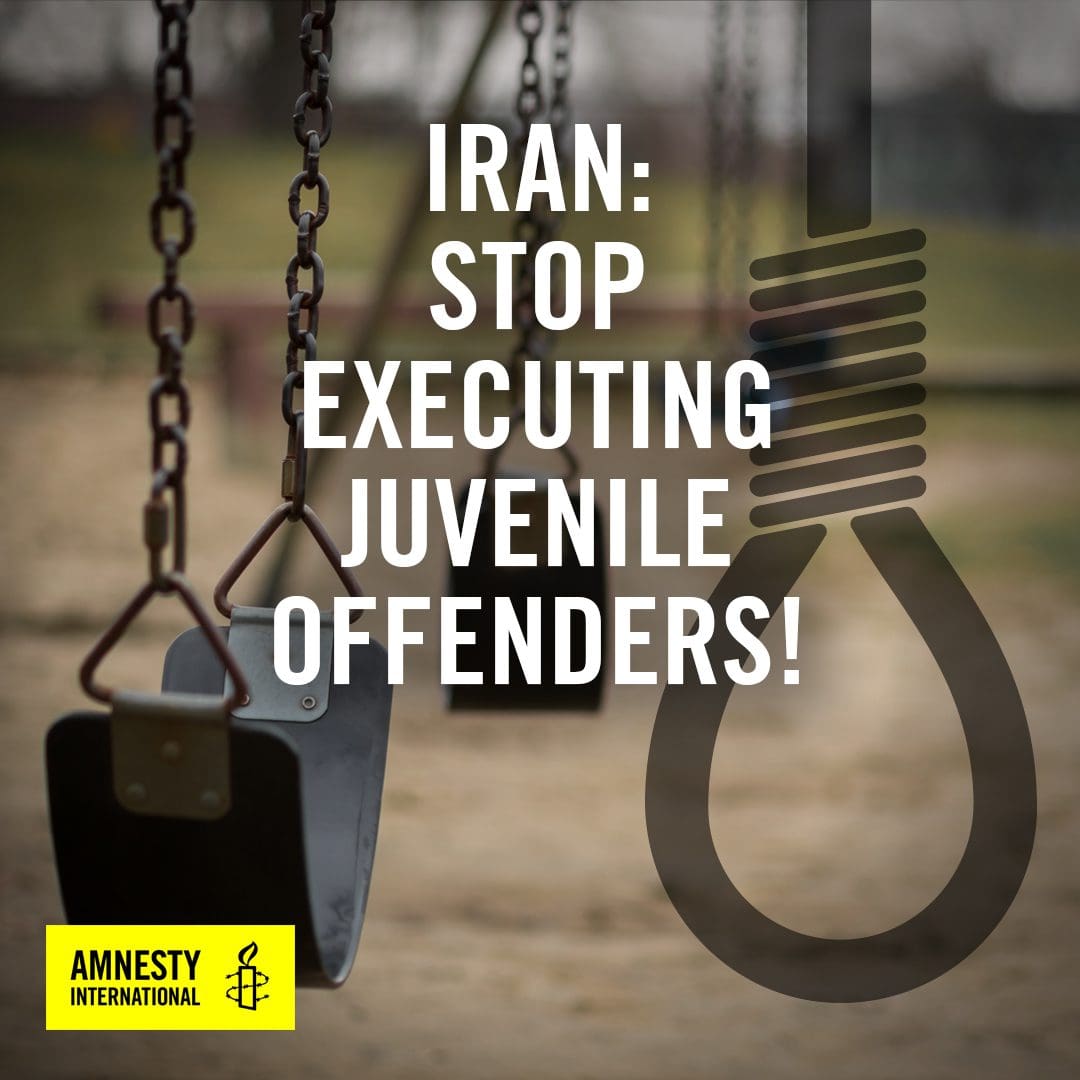
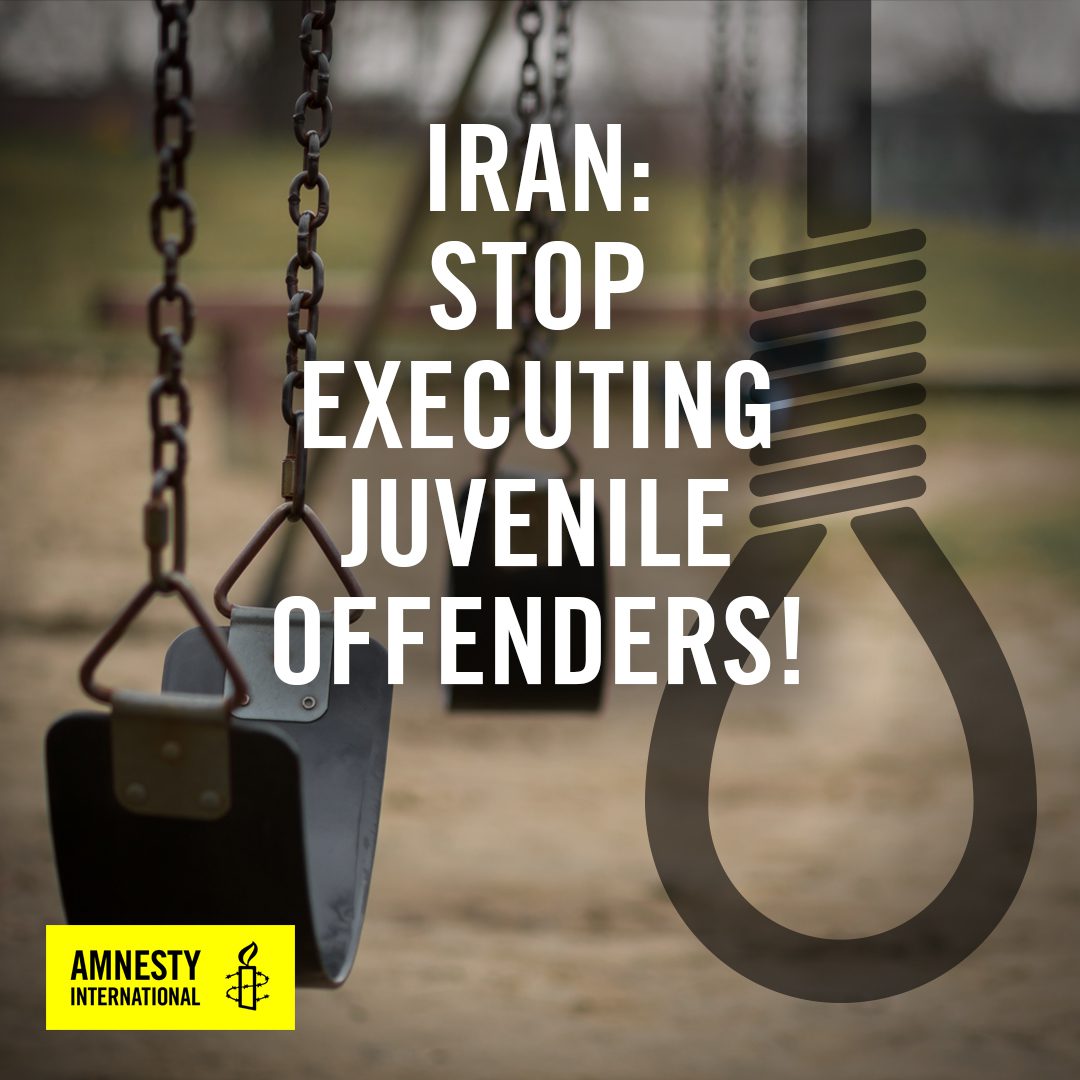
ARMIN ABDOLALI EXECUTED ON NOVEMBER 24, 2021



An egregious example of the deployment of the death penalty for political purposes is the case of Dr. Ahmadreza Djalali, a Swedish-Iranian specialist in emergency medicine. He barely escaped an execution scheduled to take place on December 1 after an international outcry, including a letter signed by 153 Nobel science prizes laureates. and was given a reprieve of unknown duration.


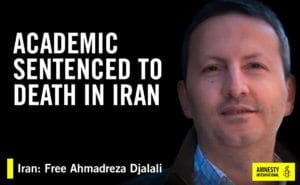
Dr. Djalali was sentenced to death for “corruption on earth” (efsad-e fel-arz) in October 2017 after a grossly unfair trial before Branch 15 of the Revolutionary Court in Tehran. The court relied primarily on “confessions” that Ahmadreza Djalali says were obtained under torture and other ill-treatment while he was held in prolonged solitary confinement without access to a lawyer. He had been arrested in April 2016 while on a trip to Iran at the invitation of Tehran University to speak about disaster medicine. He was accused of providing information to Israel that was allegedly used in the assassination of several Iranian scientists. Iranian State television aired the “confession” in December 2017. Dr. Djalali could be executed at any time Activists are urged to write to write to the head of the judiciary in Iran via Iran’s Permanent Mission to the UN in Geneva at the following email addresses: [email protected] and [email protected] .
The Iranian authorities are sensitive to international public opinion so it is essential that activists speak out against executions carried out in Iran. Please take action right away and please share the information with all your contacts so we can save Dr. Djalali who is at high risk of imminent execution.
Severe Persecution of Iran’s Ethnic Minorities
The Iranian authorities have a long history of persecuting its ethnic minorities: especially Kurds who live in Northwest Iran, Arabs (also known as Ahwazis) who live in the Southwest, and Baluchis who live in the Southeast. Iranian Kurds and Baluchis are also mostly minority Sunni Muslims (Arab Iranians are either Shi’a or Sunni). Kurds, Arabs and Baluchis live in the most economically disadvantaged regions of Iran, and face persecution for advocating for more rights for their communities. They are also far more likely to be subjected to severe torture and ill-treatment in detention, to be sentenced to death for politically motivated offenses, and to be executed.
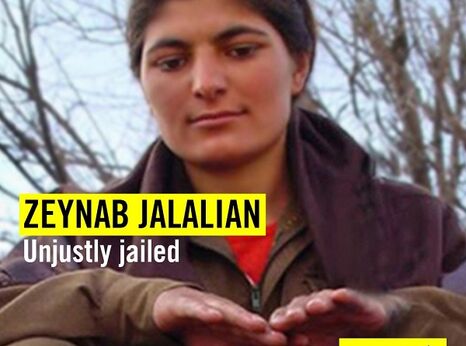
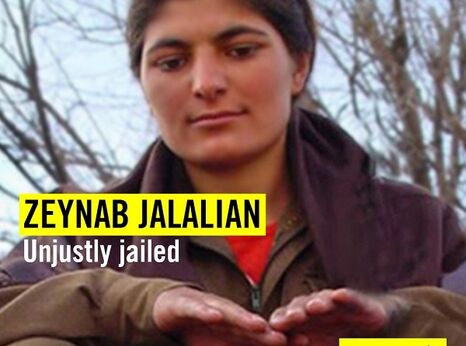
Kurdish-Iranian prisoner Zeynab Jalalian
Since 6 January 2021, at least 96 individuals from Iran’s Kurdish minority, including civil society activists, labor rights activists, environmentalists, writers, university students and political activists have been arrested by the intelligence unit of Iran’s Revolutionary Guards or Ministry of Intelligence agents. According to Kurdish human rights groups, in 2020, over 500 Iranian Kurds including human rights defenders, were arrested for politically motivated reasons and charged with broad and vaguely worded national security-related offenses. At least 159 of them were subsequently sentenced to prison terms ranging from one month to 17 years and four received the death penalty. According to UN Special Rapporteur on Iran, “Kurdish political prisoners charged with national security offences … constitute a disproportionately high number of those who received the death penalty and are executed.”
There has been an alarming rise in executions of minority prisoners; since 19 December 2020, the Iranian authorities have executed at least 53 people, about a third of them Baluchis. “The recent escalation in executions of Baluchis and Ahwazi Arabs raises serious concerns that the authorities are using the death penalty to sow fear among disadvantaged ethnic minorities, as well as the wider population. The disproportionate use of the death penalty against Iran’s ethnic minorities epitomizes the entrenched discrimination and repression they have faced for decades,” said Diana Eltahawy, Deputy Director for the Middle East and North Africa at Amnesty International.
Please go here to take action to protest the secret executions of four Ahwazi prisoners on 28 February 2021, and to call for the release of three other Ahwazi prisoners who are being denied proper medical care. The four men who were executed had been severely tortured in prison. They were forced to make confessions of their guilt; a tactic that has been repeatedly used by Iranian authorities to obtain convictions. The authorities have also refused to release their bodies to their families for burial and mourning rituals. Heidar Ghorbani, who is a Kurdish-Iranian, is at imminent risk of execution for “armed rebellion against the state” (baghi), despite serious fair trial violations and the trial court confirming that he was never armed. In August 2021, the Supreme Court rejected his second request for judicial review. His conviction is based on torture tainted “confessions” obtained while he was forcibly disappeared. Please go here to take action calling for his execution to be stayed. Please go here to take action on two Baluchi men who are at imminent risk of execution.
Please go here for more information and to this press release signed by Amnesty International and 36 other organizations about the ongoing wave of arbitrary arrests, incommunicado detention, and enforced disappearances by the Iranian authorities, targeting scores of people from Iran’s disadvantaged Kurdish minority. Please go here to take action on behalf of So’ada Khadirzadeh, an Iranian-Kurdish woman who was arrested and arbitrarily detained while pregnant; after giving birth via Caesarean Section, she was returned to prison with her newborn infant where she they are not receiving proper care.
Amnesty international actions
NASRIN SOTOUDEH

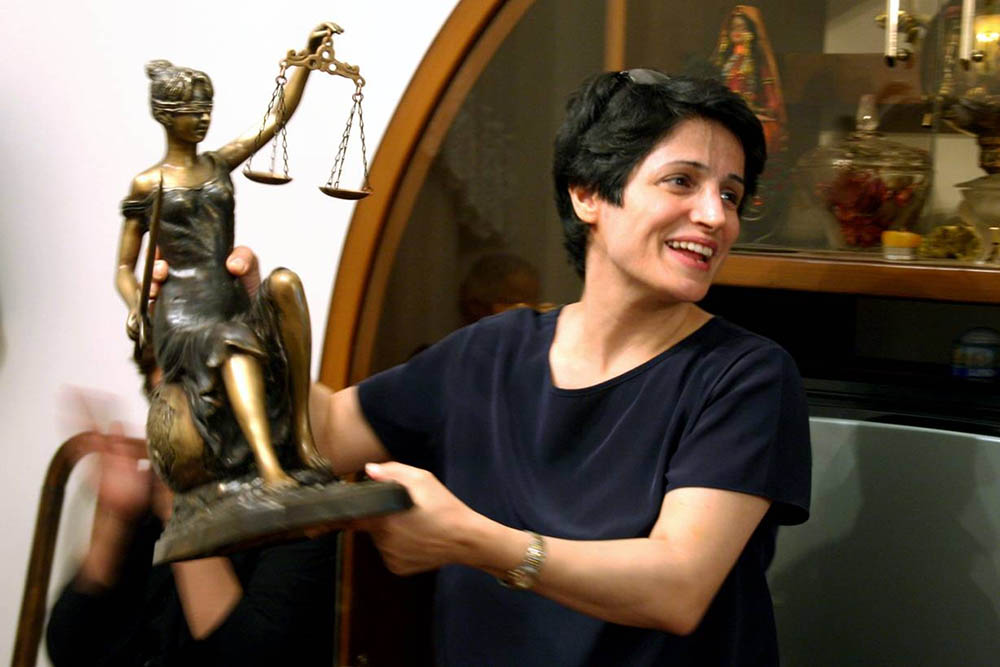
Nasrin Sotoudeh is a world-renowned Iranian human rights attorney who has won numerous prizes and accolades, including the 2012 Sakharov Prize for Freedom of Thought awarded by the European Parliament. However instead of honoring such an eminent citizen, the Iranian authorities sentenced her to an astonishing 38 years in prison plus 148 lashes solely for her peaceful advocacy and representation of her clients—one of the harshest sentences ever handed down to a prisoner of conscience in Iran. If she has to serve this entire sentence, she will be in her nineties by the time she is released.
Nasrin Sotoudeh who represented women targeted by Iranian authorities for protesting forced hijab (veiling), has been sentenced on several spurious national security-related charges including “forming a group with the purpose of disrupting national security”, “spreading propaganda against the system” and “gathering and colluding to commit crimes against national security.” She had first found out that she had been sentenced to five years in prison for “assisting in hiding spies with the intent to harm national security” imposed in absentia when she was arrested in June 2018. In March 2019 it was revealed that she had been sentenced to an additional 33 years plus the lashes.
Prisoner of Conscience in Need of Urgent Medical Care
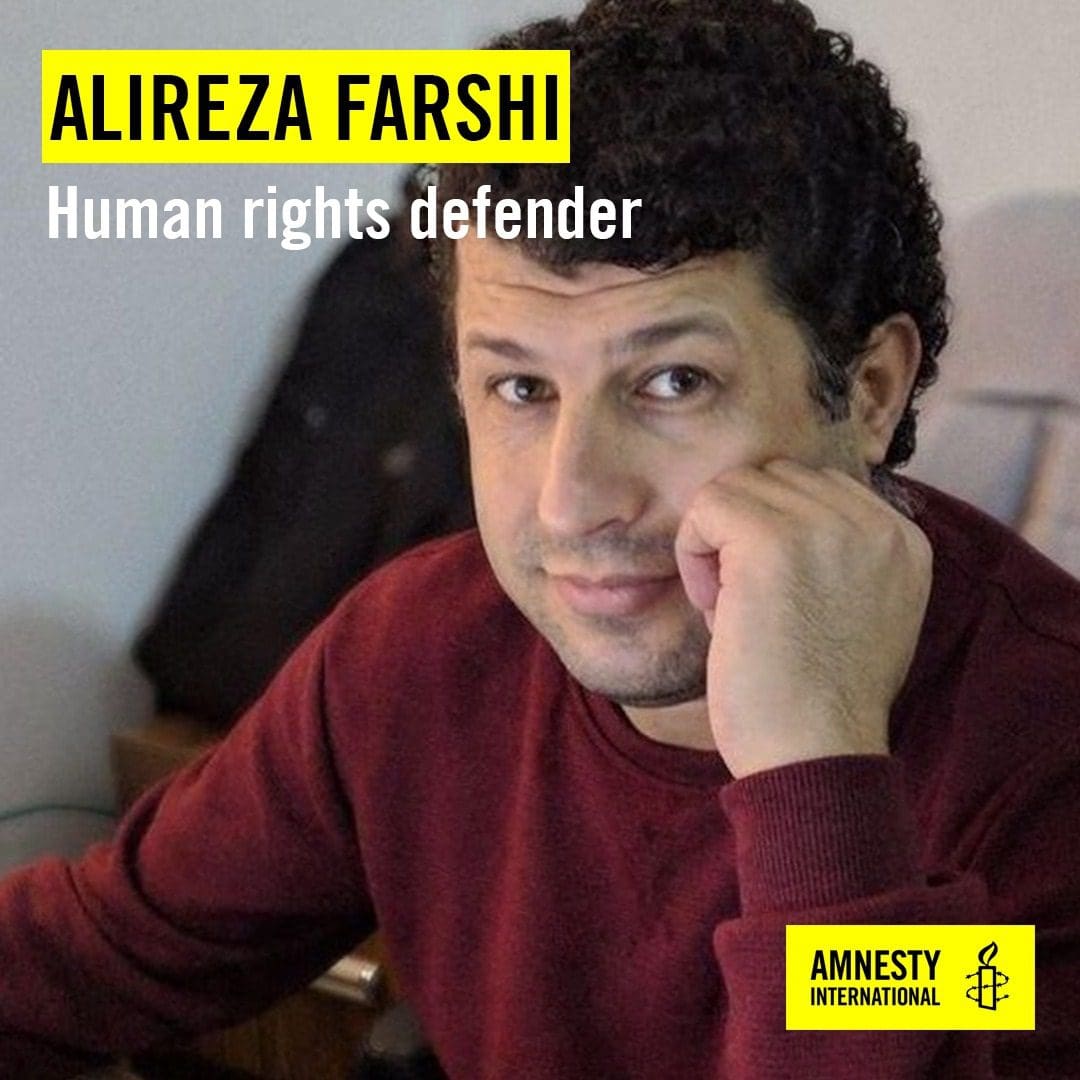
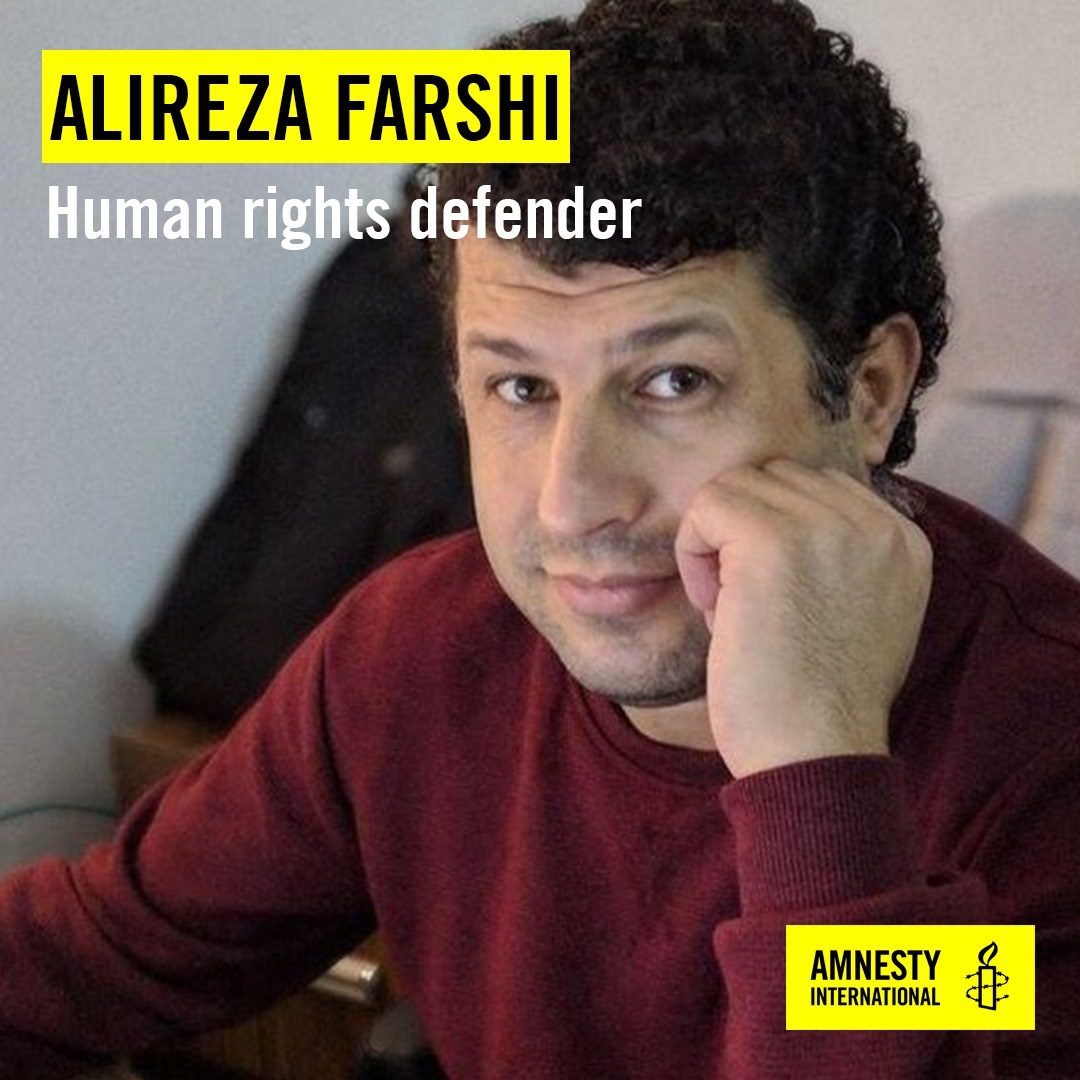
His Excellency Gholamhossein Mohseni Ejei
c/o Permanent Mission of the Islamic Republic of Iran
622 Third Avenue, 34th Floor
New York, NY 10017
Email: [email protected] or [email protected]
PERsecution of Labor Activists
For more than a year, since International Workers’ Day in 2018, Amnesty International has documented the arrests of hundreds of workers and other labor rights activists in the context of a campaign by the authorities to repress social unrest and public dissent. Courts have handed down prison sentences to dozens of them, in at least 38 cases compounding these by ordering those convicted to be flogged as well.
The Iranian authorities should also initiate impartial, independent and effective investigations into allegations that some labor rights activists, including Esmail Bakhshi and Sepideh Gholian, whose testimonies Amnesty International has documented in detail, have been tortured or otherwise ill-treated in detention in recent months. Anyone found responsible should be brought to justice in trials that meet international fair trial standards.
On May Day (May 1) 2019 Iranian authorities arrested large numbers of labor rights activists for taking part in peaceful protests. The organization renews its calls on the Iranian authorities to lift their unlawful ban on independent trade unions and allow workers to hold peaceful gatherings, including on International Workers’ Day, and to exercise their right to form and join independent trade unions.
Press Release on Abuse of Labor Activists
Nowruz Action
The Persian holiday Nowruz (“new day”) is an ancient holiday celebrated on the first day of spring to welcome in the new year. Every Nowruz we remember several courageous prisoners of conscience in Iran with Nowruz greetings. Please send cards with Nowruz greetings to let our imprisoned friends know we are thinking of them at this time.
Relevant Links
- Iran’s militarized response to May 2022 protests
- Alarming fast pace of executions in Iran in first half of 2022
- Iranian-Kurdish mother and baby denied proper care in detention
- Ahmadreza Djalali at risk for retaliatory execution
- Iranian authorities responsible for dozens of deaths in custody
- joint statement on persecution for protesting authorities' killing of family members during November 2019 protests
- Joint statement on restrictive cyberspace law
- Amnesty launches Persian language website
- Execution of juvenile offender underscores need to reform penal code
- Details of 323 people killed by security forces in November 2019
- Unjustly Detained Students Beaten in Custody
- Iran: People’s tribunal on deadly protest crackdowns must serve as wake-up call
- Suspicious Death in Custody of Witness to Torture
- Iran: Failing on All Fronts
- Detained Academic Ahmadreza Djalali needs medical attention
- Nasrin Sotoudeh’s letter to her children from prison
- Release women’s rights activists arrested for protesting against forced veiling
- Nowruz Action 2020
- Urgent Action on detained conservationists
- Amnesty International statement on Iran to the 40th session of the UN Human Rights Council
- For more information visit the Amnesty.org Country page
Iran Newsroom
August 30, 2022 • Report
Fleeing Afghans Unlawfully Returned After Coming Under Fire at Iranian and Turkish Borders
Iranian and Turkish security forces have repeatedly pushed back Afghans who attempt to cross their borders to reach safety, including by unlawfully opening fire on men, women and children, Amnesty International said today. In a new report, They don’t treat us like humans, the organization also documents numerous instances - mostly at the Iranian border - where security forces have shot directly at people as they climbed over walls or crawled under fences. Afghans who do manage to enter Iran or Turkey are routinely arbitrarily detained, and subjected to torture and other ill-treatment before being unlawfully and forcibly returned.
May 23, 2022 • Report
Death Penalty 2021: State-Sanctioned Killings Rise as Executions Spike in Iran and Saudi Arabia
2021 saw a worrying rise in executions and death sentences as some of the world’s most prolific executioners returned to business as usual and courts were unshackled from Covid-19 restrictions, Amnesty International said today in its annual review of the death penalty.
September 15, 2021 • Press Release
A Decade of Deaths in Custody Unpunished Amid Systemic Impunity for Torture in Iran
Iranian authorities have failed to provide accountability for at least 72 deaths in custody since January 2010, despite credible reports that they resulted from torture or other ill-treatment or the lethal use of firearms and tear gas by officials, said Amnesty International following yesterday’s reports of yet another suspicious death in custody.
September 1, 2020 • Report
Detainees in Iran flogged, sexually abused and given electric shocks in gruesome post-protest crackdown
Iran’s police, intelligence and security forces, and prison officials have committed, with the complicity of judges and prosecutors, a catalogue of shocking human rights violations, including arbitrary detention, enforced disappearance, …
April 20, 2020 • Report
Death penalty 2019: Global executions fell by 5%, hitting a 10-year low
Saudi Arabia executed a record number of people in 2019, despite an overall decline in executions worldwide, Amnesty International said in its 2019 global review of the death penalty published …
February 26, 2019 • Report
Human rights in the Middle East and North Africa: A review of 2018
The international community’s chilling complacency towards wide-scale human rights violations in the Middle East and North Africa (MENA) has emboldened governments to commit appalling violations during 2018 by giving them …
December 9, 2018 • Report
Oppressive, sexist policies galvanize bold fight for women’s rights in 2018
Women activists around the world have been at the forefront of the battle for human rights in 2018, Amnesty International said today as it launched its review on the state …
December 4, 2018 • Report
Iran committing crimes against humanity by concealing fate of thousands of slaughtered political dissidents
By concealing the fate and whereabouts of thousands of political dissidents who were forcibly disappeared and secretly executed in prison 30 years ago, Iranian authorities are continuing to commit crimes …
April 29, 2018 • Report
Iran: New evidence reveals deliberate desecration and destruction of multiple mass grave sites
New evidence including satellite imagery, photo and video analysis show that the Iranian authorities are deliberately destroying suspected or confirmed mass grave sites associated with the 1988 massacre in which thousands …
August 1, 2017 • Report
Iran vilifies human rights defenders as ‘enemies of the state’
Iran’s judicial and security bodies have waged a vicious crackdown against human rights defenders since Hassan Rouhani became president in 2013, demonizing and imprisoning activists who dare to stand up for people’s rights, Amnesty International said in a new report published today.

